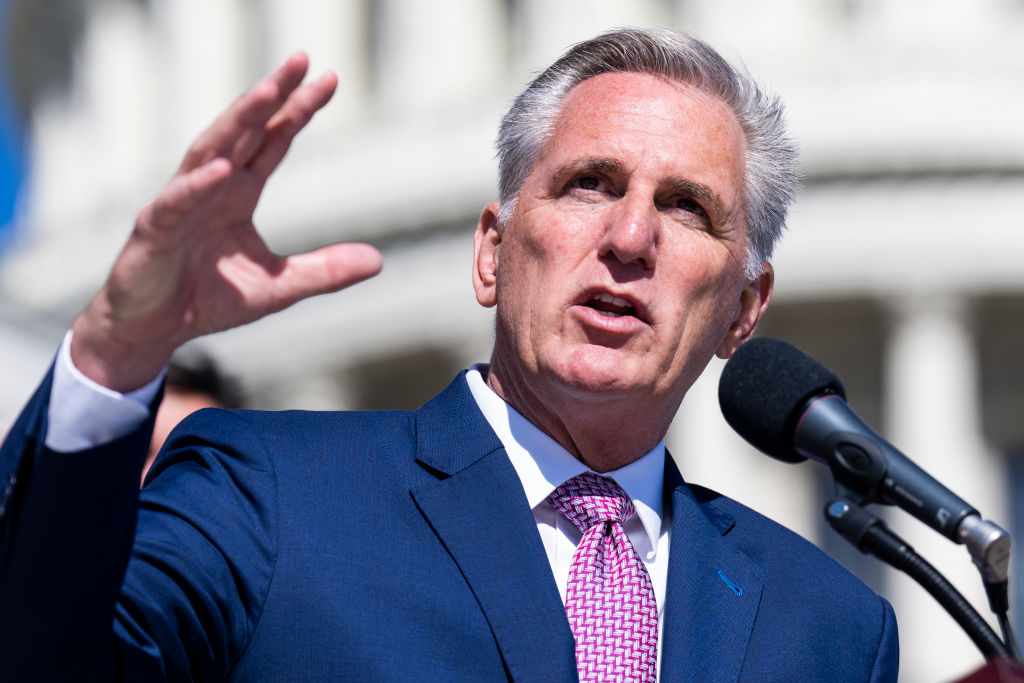
This article is part of The D.C. Brief, TIME’s politics newsletter. Sign up here to get stories like this sent to your inbox.
Inside the Beltway, there was no shortage of theories this week about what kind of long game Kevin McCarthy was running. The House Republican leader noted in an interview that a GOP-controlled House would not “write a blank check” to help Ukraine in its continued defense against Russia’s invasion. The warning was heard clearly across Washington, and in Kiev, but its intention was up for debate. Each interpretation can be as true as it is potent with regards to McCarthy, whose promotion to Speaker is his to lose with even the slightest of stumbles in the next few weeks.
Much of the reaction over the comment was at the notion that the Republican Party is prepared to leave an ally in the lurch at a critical inflection point and ceding power to Russia, all to own the libs. But for those looking more closely at McCarthy’s exact words and the timing, there may be more going on here.
“Ukraine is important,” McCarthy told Punchbowl News, “but at the same time it can’t be the only thing they do, and it can’t be a blank check.”
Let’s unpack this for a minute. McCarthy is far from walking away from Ukraine, but he is suggesting oversight is in the offing—meaning a headache for the Biden administration in a Republican-controlled 118th Congress. That alone is popular with the Republican base, which may take oversight as sufficient to satiate a growing indifference to the war. McCarthy isn’t ready to surrender to Moscow, a nod to the national security hawks in his caucus, including the likely incoming House Armed Services team led by Rep. Michael McCaul of Texas. Yet he is still having just enough jiggle in his Jell-O for the MAGA crowd over at Fox News where the primetime lineup has questioned the value and wisdom of U.S. efforts to boost Kyiv.
This year alone, the United States has allocated $60 billion in military aid for Ukraine; that sum represents the biggest checks sent to any country since the height of the Vietnam War. The dollars have helped Kyiv buy U.S.-made weapons that have made the Russian violent invasion shockingly incomplete. Ukrainians have defied expectations, shown Russia itself to be a Potemkin nation, and embarrassed Moscow in ways Cold War warriors find delightful. It hasn’t been cheap, but it to date has been executed without U.S. forces on the ground. As proxy wars go, Ukraine has been a fairly efficient investment.
Still, McCarthy says that an open-ended offer of the national American Express isn’t absolute. And the audience for his words were likely not just MAGA voters and D.C. pundits. By suggesting an expiration date for the biggest checks, McCarthy may successfully nudge Ukraine to finalize its next weapons wishlist. In turn, Congress may move to OK another round of money quicker than anticipated. After all, if Republicans do well in the midterms, and are unlikely to cut checks to Kyiv in the new year, Democrats will need to do so during the lame-duck window between Election Day and the start of the new Congress.
Maybe—and this is a big maybe—McCarthy may have helped Ukraine build its winter war.
Taken together—and assuming McCarthy made the pronouncement with considered debate inside his kitchen cabinet of advisers—his Ukraine comment paints a complicated preview of how a Speaker McCarthy may tend to his own political backyard, where hawks and heretics alike get votes, and suggests his relationship with the Biden administration may evolve in interesting ways.
One coda to all of this: McCarthy is on the cusp of grabbing the gavel. He’s tried before, and failed. His incoming caucus has been conditioned against supporting this Biden-backed war and support for it among Republicans in general is plummeting. A full 32% of Republicans tell Pew that Washington is providing too much support for Kyiv, up from 9% in March. Still, McCarthy is starting his potential turn as Speaker with backing for that country. That at least suggests he’s an emerging scholar of what’s required of the gig.
For those who were reading McCarthy’s comments close enough, there was a begrudging acknowledgement that maybe—just maybe—he now understands how to balance everything expected of a modern Speaker of the House. In hindsight, it might prove to be true that McCarthy’s statement managed to advance a responsible policy of countering Russia, while also placating the Moscow apologists in his party, giving the White House a heads-up of his limits, and setting his own agenda.
As much as it pains the many McCarthy skeptics out there, he may have actually figured out how to do the job. Now it’s up to voters in the midterms to decide if they want the Republicans to give him the chance—and if the Republicans in his caucus will give it to him.
Make sense of what matters in Washington. Sign up for the D.C. Brief newsletter.
More Must-Reads from TIME
- Cybersecurity Experts Are Sounding the Alarm on DOGE
- Meet the 2025 Women of the Year
- The Harsh Truth About Disability Inclusion
- Why Do More Young Adults Have Cancer?
- Colman Domingo Leads With Radical Love
- How to Get Better at Doing Things Alone
- Michelle Zauner Stares Down the Darkness
Write to Philip Elliott at philip.elliott@time.com